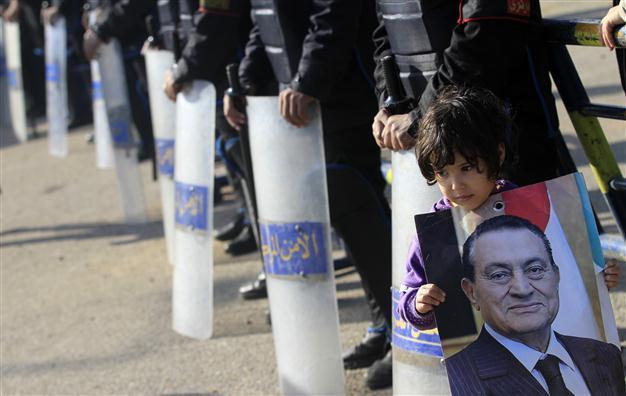Mubarak's defense lawyer praises Egypt's ex-leader
CAIRO- The Associated Press

An Egyptian girl carrying a photo of ousted Egyptian President Mubarak, stands next to riot police outside a courtroom in Cairo, Egypt, Tuesday, Jan. 17, 2012. AP photo
Hosni Mubarak's chief defense lawyer on Tuesday portrayed the ousted Egyptian president as a "clean" leader who placed the law above all else and worked tirelessly for his nation.Farid el-Deeb's opening statements to the court also sought to paint a picture of the 83-year-old Mubarak as a victim of malicious accusations while his health was failing. He was looking to the court for justice, el-Deeb said.
Mubarak is charged with complicity in the killing of hundreds of protesters during an 18-day uprising that toppled his 29-year, authoritarian regime last February. He could face the death penalty if convicted.
Lawyers for families of those killed and wounded have argued that even if Mubarak did not issue orders to shoot protesters, he failed to give orders to stop the killing. The prosecution later delivered a harsh assessment of Mubarak's rule, saying he was directly responsible for the killing of protesters and that he devoted the last 10 of his nearly three decades in power to ensure that his son, banker-turned-politician Gamal, would succeed him.
Mubarak and his two sons wealthy businessman Alaa and Gamal also face corruption charges. All three were in court Tuesday.
As has been the practice since the trial began on Aug. 3, Mubarak was brought by helicopter to the courthouse a lecture room in a police academy that once bore his name from a hospital where he is held in custody east of Cairo. He appeared in court laying on a gurney inside a metal defendants' cage, wearing dark sunglasses and covered by a blanket.
Judge Ahmed Rifaat has given the Mubaraks' defense lawyers five sessions in court to state their case.
"Mubarak is neither a tyrant nor a bloodthirsty man. He respects the judiciary and its decisions. A clean man who could say no wrong," said el-Deeb, who has built up a reputation over the years as a highly paid celebrity lawyer.
"This man who stands in front of you is 83, fatigued by ailments after devoting his entire life to the service of his nation. He has been mauled by malicious talk. He has been targeted from all directions and his reputation has been hit by tongues and pens," said el-Deeb, who is also defending Alaa and Gamal.
The three have eight co-defendants, including Mubarak's former security chief Habib el-Adly and six top police commanders. El-Adly and four of the six commanders are charged with complicity in the killing of the protesters. A friend of the Mubarak family's, fugitive Hussein Salem, is also facing corruption charges.
El-Deeb enraged lawyers for the victims on Tuesday when he claimed that Mubarak supported the uprising that toppled him. He quoted from a letter Mubarak wrote to lifetime friend and Cabinet minister Ahmed Shafiq, whom he named as prime minister during the uprising.
In that letter, Mubarak said the protesters were exercising their right to stage peaceful protests but were infiltrated by criminals and Islamists who sabotaged public property and challenged the regime's "legitimacy." El-Deeb also chastised the prosecution for what he said was its deviation from its task when its opening statements were political rather than focused on the legal aspects of the case.
Bringing those responsible for the killing of protesters during the Jan. 25-Feb. 11 uprising is a thorny issue in post-Mubarak Egypt. Activists believe the enerals who took over from Mubarak were not serious about punishing the killers, citing the acquittal or release on bail of members of the hated police force who are linked to the killings. There have been several protests over the past week in Cairo and the city of Suez over such cases, with families of the victims accusing the ruling generals of manipulating the courts to acquit defendants in such cases.
More than 800 protesters are thought to have been killed in the uprising, but authorities believe that many of them were members of criminal gangs that attacked police stations to free detained suspects or seize weapons.
















